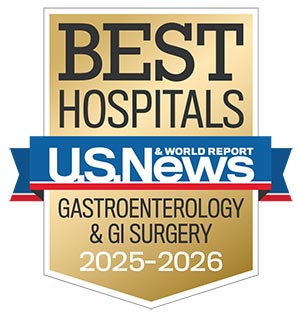Cancer Genetics Program Expands as Universal Screening for Lynch Syndrome Considered
The Penn State Hershey Cancer Genetics Program was developed in 1998 to provide genetic counseling services to individuals concerned about a personal or family history of cancer. New patient appointments typically involve the development of a three- or four-generation family pedigree, education about various risk factors for developing cancer, and discussion regarding risks, benefits, and limitations of genetic testing, if appropriate. Options to manage one’s increased risk for cancer are reviewed, including dietary and lifestyle changes, as well as enhanced surveillance, chemoprevention, and prophylactic surgery.
Over the past fourteen years, nearly 300 patients have been identified to carry a genetic predisposition to cancer. Hereditary gastrointestinal cancer syndromes identified include not only the more common ones such as Lynch syndrome, FAP, and MYH-Associated Polyposis (MAP), but also the more rare conditions such as Cowden syndrome (or PTEN Hamartoma Tumor syndrome), Peutz-Jeghers syndrome, and Hereditary Diffuse Gastric Cancer syndrome.
Referrals to the Cancer Genetics Program continue to increase with more than 450 referrals last year alone. Fortunately, to address this increasing demand, the Cancer Genetics Program has expanded to include an additional genetic counselor, Rio C. Stenner, MGC, CGC, who graduated with her Master’s degree in genetic counseling from the University of Maryland, School of Medicine.
One of the program’s research interests involves identifying barriers that prevent high risk patients from receiving cancer genetic counseling services and the option of genetic testing. According to Maria Baker, PhD, “Our paper by Mukherjee et al., entitled The revised Bethesda guidelines: extent of utilization in a university hospital medical center with a cancer genetics program, identified a number of barriers that prevent patients from being diagnosed with Lynch syndrome, the most common hereditary cause of colorectal cancer (CRC).” As a result of these findings, Penn State Health Milton S. Hershey Medical Center along with a growing number of institutions across the country, are considering the pros and cons of implementing universal screening of all CRC specimens for Lynch syndrome. Studies show that one in 35 patients (or 2.9 percent) with CRC has Lynch syndrome, and that only 72 percent of CRC patients with Lynch syndrome meet revised Bethesda guidelines. The Penn State Hershey study showed that of those patients whose family histories did meet revised Bethesda guidelines, only 4.9 percent over the course of one year met with a genetic counselor to discuss concerns regarding family history and consider the option of genetic screening.
Given the underutilization of cancer genetic counseling services by this high-risk population, it is imperative that we take a public health approach to identifying patients and their family members with Lynch syndrome. Studies have shown that the cost-effectiveness ratio of universal screening of all CRC for Lynch syndrome is <$25,000 per life year saved, which is comparable to other preventative services such as colonoscopy every ten years. Based on our research findings and that of others, it should come as no surprise that one of the Healthy People 2020 objectives is to increase the proportion of individuals with newly diagnosed CRC who receive genetic testing to identify Lynch syndrome.
For more information about the program or to refer a patient, please call 717-531-1631. Visit us online at PennStateHershey.org/geneticcounseling.

Maria Baker, PhD
Professor of Medicine
Department of Medicine Penn State Health Hershey Cancer Genetics Program Penn State Cancer Institute
Penn State College of Medicine
Phone: 717-531-1631
Email: mjm23@psu.edu
PhD Studies: Penn State University
Connect with Penn State Health Gastroenterology and Hepatology on Doximity

